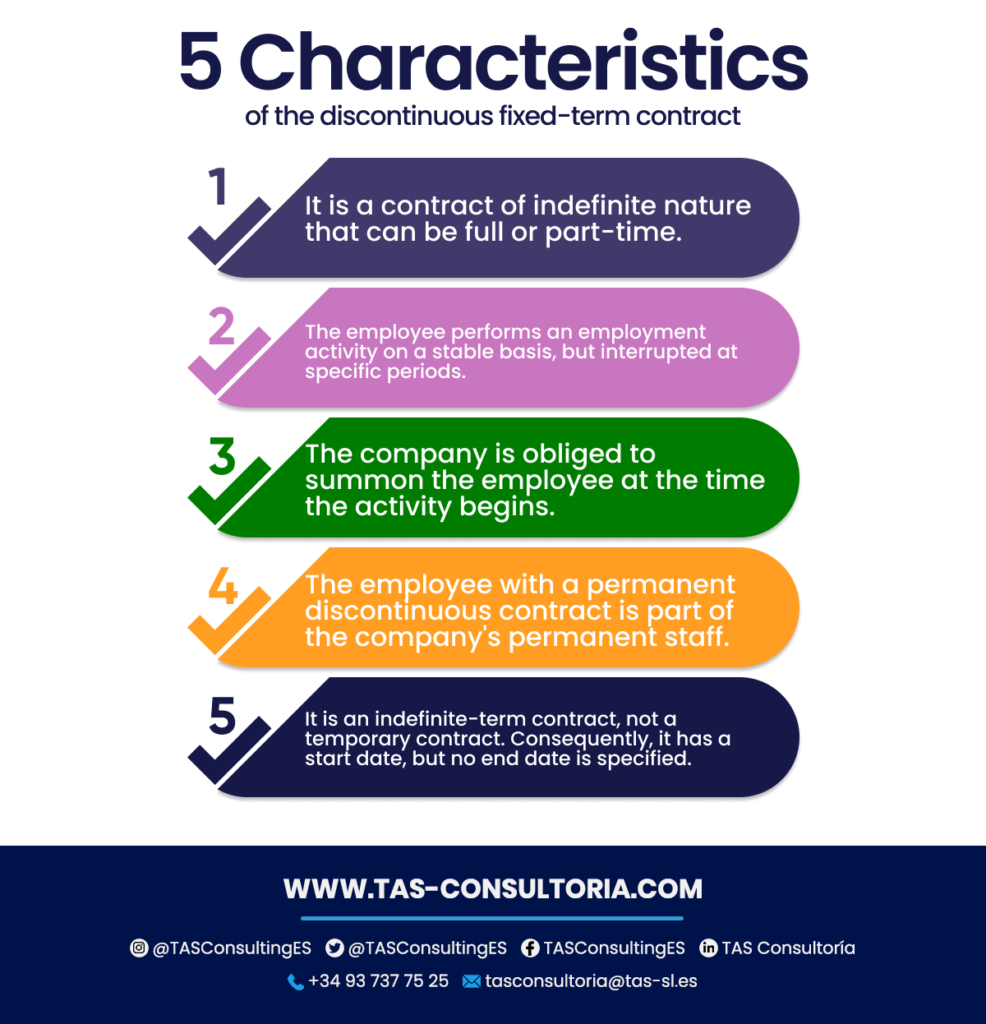
The fixed-discontinuous contract has particularities that you should know if you are interested in the labor world or you are an employer. If so, stay here because we will explore what the fixed-term contract is and in what situations it applies. If you want to better understand this aspect of the Spanish labor market and how it can affect your job or business, keep reading! Discover the keys to this contract and how it can influence your future employment.
What is a fixed-term contract?
Discontinuous fixed-term or indefinite-term contracts with intermittent activities are a very common contractual model. It is characterized by the execution of work activities on a constant but not continuous basis.
In short, this type of contract is intended for occupations that are seasonal. That is to say, jobs that are performed during specific months and that the company does not require throughout the year. If not only in specific periods.
This contractual arrangement is used in sectors such as ski resorts. Where workers are indispensable every year, but only during the snow season. This being the case, the fixed contract is established in Article 16 of the Workers’ Statute.
Another example of employees with this type of contract are those who work in public swimming pools or as camp monitors. Even those who work in the harvesting of crops.
That said, this contract provides job security for employees working on a temporary basis. Those who have a fixed-term contract with intermittent activities can provide their services to the company whenever necessary. In addition, their social security contributions are guaranteed, since they are part of the company’s workforce.
You may also be interested in: The labor market in Spain
Characteristics of the fixed-term contract
To begin with, it is essential that, like any employment contract, this contract be formalized in writing. It must include information on the estimated duration of the activity, the type of working day and distribution of schedules. In addition, other important aspects should be detailed, such as the procedure and the order to require the worker as established in the collective bargaining agreement.
In this regard, contact with the employee shall be made by a means that allows a record to be made. For example, a notification to the interested party, including the conditions of their incorporation and with due notice.
In this context, we can highlight some of the main characteristics of the fixed term contract:

When to apply the fixed-discontinuous contract with intermittent activities?
As mentioned above, when drawing up a fixed-discontinuous contract, the company is obliged to summon the worker. Always for the next period of activity. During the provision of services, the worker pays Social Security contributions and receives the corresponding salary for the time worked.
At the end of the season, the company provides the employee with a severance payment. This is not the same as a settlement for termination of contract or dismissal, but rather a compensation for outstanding debts owed to the employee.
Therefore, during the period of inactivity, the contract remains in an inactive status until the next solicitation is made.
During this time, the worker does not receive a salary or pay Social Security contributions for that company. Therefore, he/she is entitled to apply for unemployment benefits or to work for other companies. Unless he/she has agreed exclusivity during the formalization of the permanent contract or his/her situation is under a non-competition agreement.
You may also be interested in: New labor reform in Spain 2021-2022
Advantages of a fixed-term contract with intermittent activities
The indefinite-term contract with intermittent activities implies a series of benefits for both companies and workers.
However, this type of temporary hiring also has some disadvantages. Workers will only receive income during certain months of the year, which may affect their right to unemployment benefits. It is necessary to have paid a minimum amount of contributions to access this benefit. In addition, some companies may abuse the fixed-term contract to carry out fraudulent practices.
However, we explain the advantages in detail:
Benefits for the company
- Tax incentives: bonuses or reductions in tax charges for hiring employees on an indefinite-term basis.
- Stability in the team: by having experienced workers in the company, the need for initial training is reduced.
- Labor flexibility: the company can hire according to seasonal demands and market conditions.
- Legal compliance: the fixed-term contract ensures compliance with labor regulations, avoiding possible sanctions.
Benefits for employees
- Stability in employment: the worker will be called whenever the need for work arises.
- Equal labor rights: the employee has the same rights as other employees of the organization.
- Economic incentives: the employee enjoys bonuses and reductions in social security contributions.
You may also be interested in: Flexible compensation: definition and benefits
Are you looking to optimize your company’s human resources management and ensure a successful employment path? We encourage you to request a consultation with our experts at tasconsultoria@tas-sl.es. We are here to help you navigate the complexities of this fixed contract and achieve efficient personnel management. Don’t hesitate to request your consultation and boost your HR strategies!




Your email address will not be published .
Required fields are marked with *